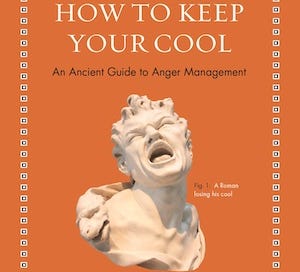[Based on How to Keep Your Cool: An Ancient Guide to Anger Management, by Seneca, translated by James S. Romm. Full book series here.]
People really want to be angry. Every time that I write about Seneca’s On Anger, one of the most important books in the Stoic canon, someone responds that of course anger can be good, it is natural, it can be righteous, and so forth.
Well, as Epictetus would put it, other people’s opinions are up to them. But in this case I’m squarely with Seneca: anger is always unequivocally bad, and we need to work on it. Let me explain why.
The Stoic theory of psychology, which is in line with modern cognitive behavioral science, is that emotions have a cognitive component. Which means that, contra popular misunderstandings, emotions and reasons are inextricably intertwined, and both Plato and Freud were wrong.
Consider, for instance, what happens when you get angry because someone insulted you. You may get angry. If I ask you why you are angry, you are perfectly capable of providing me with a narrative explanation, something along the lines of: “He said I was an idiot, and I’m not. It is offensive to be called an idiot. That’s why I’m angry.”
But in fact you can challenge that explanation, particularly the notion that we ought to be offended, and then angry, at a perceived sleight. Why? Why not ignore the offense instead? After all, presumably what the other person wants is precisely to rile you up, to make you angry, to push you emotionally off balance. If you do get angry you are simply playing into their expectations.
Emotional responses are not inevitable. They are a choice we make. Often that choice is by default, because we grew up in an environment in which if someone says something offensive you are expected to get upset. But it is perfectly possible to train oneself to respond differently. Imagine how disappointed the other person will be when you simply shrug your shoulders and move on. They didn’t get what they wanted, because you didn’t fall into their trap.
You may object that by not reacting you are behaving like a doormat, allowing the other person to walk all over you. But that interpretation is, again, the result of societal expectations. Why is it that not reacting to a provocation is a sign of weakness rather than strength?
Another objection: isn’t it good to vent anger, or other strong emotions, once in a while? Isn’t it the case that if we bottle it up at some point later on we’ll explode, with far worse consequences? No, it is not the case. This kind of reasoning assumes the so-called “hydraulic” model of emotions, which treats them as akin to gases that can build pressure on the conduits of our nervous system, and which need “valves” to release them and lower the pressure from time to time. Freud proposed the hydraulic model, and it is nonsense on stilts. That’s just not how emotions work.
Okay, you may continue, but sometimes there are good reasons to be angry. For instance if we have witnessed an injustice, such as an act of discrimination, or an episode of brutality. Again, no. What is both understandable and actually useful is to allow yourself to feel indignation, a signal that a wrong has been done and that justice demands it to be corrected. But anger is destructive, of self and of others, and thus an unhealthy emotion.
What’s unhealthy about it? It temporarily overrides reason, which means that we act guided not by the most refined faculty that evolution has given us, but blindly, driven by rage. Moreover, anger undermines our character: the more we indulge in it the worse a person we become, getting into the habit of cultivating revenge and possibly hatred rather than compassion and understanding.
This is not to say that anger cannot be effective. Of course it can. It may motivate people to act and to stand up for their rights or those of others. But if you need to feel anger in order to do the right thing you are like someone who needs a crutch in order to walk: you won’t be able to do it as well. Moreover, even when your anger appears to be justified you may overreact and undermine your own objectives, because you have allowed your reasoning faculty to be overpowered.
Seneca’s book is a sophisticated analysis of the nature of anger, followed by very practical pointers on how to recognize it and diffuse it before the damage is done, or even how to prevent it entirely. This is pretty much the same advice you’ll get from the site on anger management put out by the American Psychological Association. That’s how far ahead of his time Seneca and the Stoics were.
The following are some highlights from How to Keep Your Cool, with accompanying brief commentaries:
“Some wise men have called anger a brief madness. … To understand that those in the grips of anger are not sane, look at how they present themselves. … Their eyes burn and flash, their whole face reddens with blood that boils up from their innermost organs, their lips tremble, their teeth clench, their hair bristles and stands on end, their breath becomes labored and gasping.” (I.1)
Anger is temporary madness. And sure enough, people in the throw of anger look crazy. Stoic psychology recognizes two fundamental classes of emotions: healthy ones and unhealthy ones. What distinguishes the two is whether they are aligned with or in opposition to reason. Love (of the proper kind), joy (for the proper things), and a sense of justice are healthy. Anger, fear, and hatred are unhealthy.
You may object that even the supposedly unhealthy emotions are still natural, so they must have evolved for a reason. But not every evolved characteristic of human beings is good for us. For instance, walking erect causes all sorts of vascular, nerve, and bone issues. These issues are a byproduct of the evolution of bipedalism, but they are not, in their own right, good.
Or consider fear, especially fear of things to come, like our own mortality. It hardly does any good, other than causing anxiety and potentially paralyze us, getting in the way of enjoying our life and rationally plan ahead for our future.
“I say that no plague has done more harm to humankind. You’ll see slaughters, poisons, mutual mud-slinging of litigants, wreckage of cities, extinctions of whole races, … torches touched to buildings, flames not contained within walls but, held by an enemy host, gleaming over vast spans of territory.” (I.2)
Anger, Seneca reminds us, has caused havoc among families, has broken friendship, and has even led to widespread war and destruction. That’s because people let it take over and undermine not only reason, but the better part of their human nature, including their ability to empathize or sympathize with others, their capacity for forgiveness, and their compassion.
Much of the harm caused by anger could be avoided if we paused before acting, letting the anger subside and recovering our ability to reason. Is it really that important if that guy cut me off on the highway? How crucial is it that I redress every perceived sleight? Why do I choose resentment, which fuels anger and triggers vengeance, rather than forgiveness?
“‘What then?’ someone says. ‘Does a good man not get angry? Even if he watches his father get killed or his mother raped?’ He won’t get angry, but he’ll avenge them or he’ll protect them. … There is no emotion more eager for vengeance than anger, and for that very reason, none less suited to the taking of vengeance.” (I.12)
Vengeance is not the same as justice. That is why we live in societies where it is up to an impartial judge and jury to determine if someone is guilty of a crime and what punishment ought to be applied given the circumstances. We abandoned the ways of the wild west precisely because we recognize that anger, however understandable it may be, is not a good guide to redress injustice.
When we are angry we are particularly prone to distort the facts to suit our preconceptions, and therefore to punish the wrong person. Or to punish the right person too harshly. Indeed, why talk about punishment at all? The Stoics teach that the point of our actions should be to help people see the error of their ways and to recover them to society. Treatment, education, and rehabilitation, not punishment and revenge.
One of the most reprehensible customs of American society is the death penalty. The United States are the only western country to still include the practice in their justice system. Equally puzzling is the fact that the relatives of the victims of the crime are invited to watch the execution of the perpetrator. Allegedly, the reason is for the family to achieve closure. But in reality it’s about revenge.
“We will examine the nature and intent of those who do [the actions that anger us]. Say it’s your child: chalk it up to his age; he doesn’t know that what he did was wrong. Your father: either he’s done so much to help you that he’s earned the right to also do wrong, or perhaps it’s his very merit that offends us. … It’s an animal that can’t speak, or nearly so: you are doing just what it does, by getting angry. It’s an illness or a catastrophe: it will pass more gently if you bear up. … It’s a good man that harms you: don’t believe it. It’s a bad man: don’t be surprised. He’ll pay to another the penalty that he owes to you, and indeed he already penalizes himself by doing wrong.” (II.30)
If we pause and consider, as Seneca advises here, who is doing us harm and why we may be able to come up with good reasons to forgive them. Most of the times we’ll recognize pretty quickly that it makes no sense for us to get angry. Let us make the effort to extend the same charitable approach even to the difficult cases, so that we may err on the side of goodwill rather than hostility.
The last bit of this quote suggests that the worst punishment for an offense lies in the fact that one is undermining one’s own character, the most precious thing we have as human beings. Even if the person does not realize it, the damage is real, and indeed we should be even more compassionate toward someone who just doesn’t get that doing harm to others is self-destructive because it erodes their humanity.
“Sextius [a Roman Stoic of the first century BCE] used to do this, when, at the day’s end, as he prepared himself for nighttime rest, he would ask his own mind: ‘Which of your offenses have you cured today? Which fault have you blocked? In what area are you better.’ … What a sleep follows after this inspection of oneself; how peaceful, deep, and free of care—after the mind has been either praised or scolded, and the observer and hidden judge of the self has searched one’s character. … I plead a case every day in my own private court session. When the daylight has faded from view, and my wife, who knows well this custom of mine, keeps quiet, I become an inspector and reexamine the course of my day, my deeds and words; I hide nothing from myself, I omit nothing. … See that you don’t do that any more [I tell myself], but this time I forgive you. You spoke too combatively in that quarrel, so from now on don’t spend time with the ignorant; if they haven’t learned by now, they don’t want to. You scolded that fellow with less restraint than you should have, and thus gave offense rather than helping.” (III.36)
This passage is one of the bases (another one is Epictetus’s Discourses, III.10) for the modern Stoic practice often referred to as philosophical journaling, which is also recommended in cognitive behavioral therapy. It can be done in a variety of ways, and Marcus Aurelius’s entire Meditations is an example of it.
The basic idea is to examine ethically salient episodes of your day and see what you can learn from your own reactions, particularly in terms of preparing your mind to handle similar situations better in the future. While Seneca probably carried out the exercise mentally, my recommendation is to do it in writing. Try to stay away from emotional language, the point isn’t to relive potentially troubling experiences, but to analyze them and extract useful lessons from them. It also helps if you write in the second person, as Marcus did, as if you were addressing a good friend of yours. This also reduces your emotional involvement and augments your ability to rationally look at what happened and why.
It takes only a few minutes, and I’ve done it almost every night for a good number of years now. By doing it regularly you create a record of your successes and setbacks, which, especially if done in electronic form, becomes a searchable database of your responses and a timeline of your progress. One of the most useful things you can do when embarking on the Stoic path.
[Next in this series: How to Think About God with Cicero. Previous installments: I, II, III, IV, V, VI, VII, VIII, IX, X, XI, XII, XIII, XIV, XV, XVI.]







Couldn’t agree with you. I was of the Freudian belief but I soon realized the anger upset a lot of people around you especially the lived ones& of course it shows your own character. I have read this version of Seneca. Thanks for sharing your comments. Always a pleasure to read it.
Seneca has always been my favorite Stoic... I know, plenty of personal flaws, reportedly; and M Rufus, Epictetus, Marcus A are all nice too-just saying. But as with all, who write of things/life/“philosophy”as if writ in black or white, I still find myself agreeing with him, with a few “yah, but(s)” That said, he is fundamentally right on anger, in my experience/opinion. Anger has always hurt much more than helped, in my life.